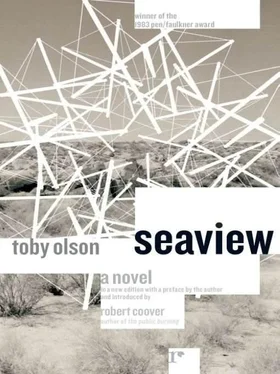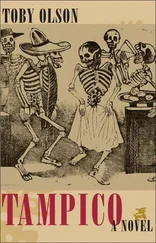“Don’t know about this salt and pepper,” he said.
“I can take care of that,” she said. “Is snake dry or oily? It looks dry.”
“Snake is very dry,” he said.
“We’ll need some oil,” she said. She got oil from the styrofoam picnic basket they carried with them.
“Is it open or closed when they cook it?”
“I remember they do it open, I believe,” he said.
“I thought it might be,” she said. “We can do it on foil with holes in it, to let the smoke through and keep the juices in.”
The story Bob White had told about hunting rattlers had to do with using hand shadows to get them away from holes. In the story he had told of the one time he had felt very close to a snake. This had happened as the snake watched the shadow, becoming in its fury and intensity sort of hypnotized. What had happened was that he had gotten himself kind of lost in watching the snake’s eyes watch the shadow of his hands. It was almost as if the eyes drew him closer, the sheer will of the unblinking force causing the shadow and his hands with it to move too close to the snake. He had awakened in time, and the snake just missed his hands when it struck. He had felt very close to the snake that time.
While they were working, he with the clippings, she with the foil with the holes in it for cooking the snake and with the oil and the salt and pepper, she thought about the other story, the one she had enjoyed most, the familiar one about his childhood that had reminded her, in its way, of her own.
IT IS SAID THAT I WAS BORN ROBERT WHITELAW IN NINETEEN and twenty-three. They say this was before much development out this way, and things were pretty good for Indians, almost as good as they are now, but in the middle there things went downhill. My grandmother, who was a Pamet Wampanoag, had come from the East with her father after her mother had died. She married my grandfather, a Pima, and my father was born to them. When my father got ready to begin to think about getting married, my grandmother fixed him up with a Pamet woman who had come out West for other reasons. This woman became my mother. I begin to remember very well about the times when I was seven years old and up. Maybe I remember the tail end of those good times they say were going on in ’twenty-three. But this story is about a time when I was ten years old, so you can forget about what I have just said and listen to what I am going to tell you. My family was not too poor; my father had a few horses, and he worked some on the railroad there. On this day we went in to that place where you picked me up. It was different then, that road was the highway then, and that place was a store with a lot of supplies in it and a place where people who drove along stopped to buy souvenirs of the Southwest. Behind that place they had rattlesnakes and armadillos and some prairie dogs in cages. I think they had a coyote there, but he was very scrawny if they did. People I knew sold them snakes sometimes.
Well, on this day my father took me and we went there, to that place. My father wanted to get some rope there or something. When we rode up, there were a few cars there, maybe five of them, old cars like they used to drive then, but then the cars were new. I wanted to stay outside and watch the people stretch and go out back to see the snakes and things, so I did that while my father went inside to shop around. It was a hot day, and I had an old derby hat on my head. I believe I found that hat along the highway one day. There were two families there who had stopped there in a fairly big car. There were two men and two women and four or five kids. The kids were older than I was. The grownups were younger than my father. One of the men had a camera and a stand for it, and he was taking pictures. He would tell the people to move around so he could take their pictures in front of things. They kept moving around, and once he even had them stand in front of the big car so he could take their picture there. Hell , I thought, that man is nuts with that camera . I used to talk to myself in that way. It was the way my father talked sometimes about white men, and I loved my father and the way he talked. I was leaning against the side of the building there, and I had a weed in my mouth to keep it wet, and I had my derby hat tilted down on my forehead against the sun, but because I thought it looked good that way too. I think I must have looked very funny there, the way kids can do when they stand around like that.
Anyway, those people were looking over at me sometimes, whispering to one another, laughing sometimes, looking the other way. The man with the camera wasn’t seeing me though, though he might have when he pulled up, because he was busy moving the people around for picture taking. Finally, he did see me though, and when he did he just stopped everything, left his camera sit on his stand, put his hands on his hips, and just stared at me. I looked away from where I was looking at them, but I couldn’t keep my head away, and when I turned it back, the man spoke to me. He said something like, Hey, kid, come here a minute. I thought I had nothing to do so I went over there. He said he would give me a quarter if I would take some pictures with them. I said okay. The first one was for me to push the button while he lined up with the others in front of the car. I did that one. Then he said I should get in line and he’d take my picture with the others. After that he wanted to take a picture of me in my derby. Then one of the kids talked to one of the women, who told the man I should put on one of those headbands they sold in the store with a feather in it. I took that picture with the kids. They too put headbands on.
Now this is where it starts to get good, if you want to say that about it. The man running the camera said that the other man should lift me up on his shoulders for a picture. I got up there, and the man with the camera got ready, but then he stopped and ran over to the car and got one of those small toy tomahawks out of it. He gave it to me, reaching it up above the other man to where I sat. He said I should hold the tomahawk up in the air and look mean. Well, I did that one, and then pretty soon they were telling me to do all sorts of things for pictures. In one time, they told me to pretend to scalp one of the women. I didn’t know where to put the tomahawk, but they showed me. In another one they had me point a little bow and arrow at the kids, who they had hold up their hands and lean back as if they feared me. It was when they were having me do the one with the rubber knife, in which I held it across the throat of one of the girls-I had to stand on my toes to reach her, because she was very tall that my father came out of the store and saw what was going on with me and the people there.
He had some rope and some few bundles, and I don’t think he would have broken his stride coming out of the place when he saw me, but he did drop one of the bundles and had to pick it up. When he did that he didn’t look my way, but he went right over to the horses. He tied his bundles onto the saddle straps and put the rope over the horn. The man took the picture then, and I dropped the rubber knife and walked away. My father was on his horse, and he walked it to the edge of the highway, where he stopped it. Then both my father and the horse, it seems to me, looked both ways down the highway as he had taught me to do. Then my father crossed the road on the horse. When he got to the other side, he pulled up. He kept his horse facing away from me and the people and the cars. He just sat there on the horse, aiming in the direction of the desert there and over in it to where we lived at that time. I know for sure that there was no talking right then or calling out.
I climbed onto my horse, and when I threw my leg over it, I could tell by the way the sun hit my face that I had forgotten my derby. I walked my horse over to the edge of the highway. After I stopped and looked both ways and when my horse’s hoofs started to click on the highway, my father started his horse up, and when we were both over there in the desert, I was about thirty feet behind him. I knew I had to stay there and go the whole way like that on the ride home. We didn’t pass too many people, but we did pass some, people we knew and ones we didn’t. All these people looked at us riding this way. I was always thinking that they all knew I had done wrong. By the time we got home I was very tired and hot and sad. My father never said a word about all this when it was over. Maybe that evening he patted my back or smiled at me or some such thing. When the times of a thing were over with my father they were over. Even now and at this somewhat significant distance from the events told in what I have just spoken about, I cannot append some powerful moral to this tale beyond the obvious. I would say, though, however vaguely I might put it, that there was something about disentanglement and walking away that has stayed with me from it. Sometimes, I guess, in some circumstances, there is no other hope for it, no help on the inside. I remember that trip home behind my father as a kind of purgatory passage. I bore it with some lessening of pain, I guess, because there was a kind of light at the end of it.
Читать дальше












